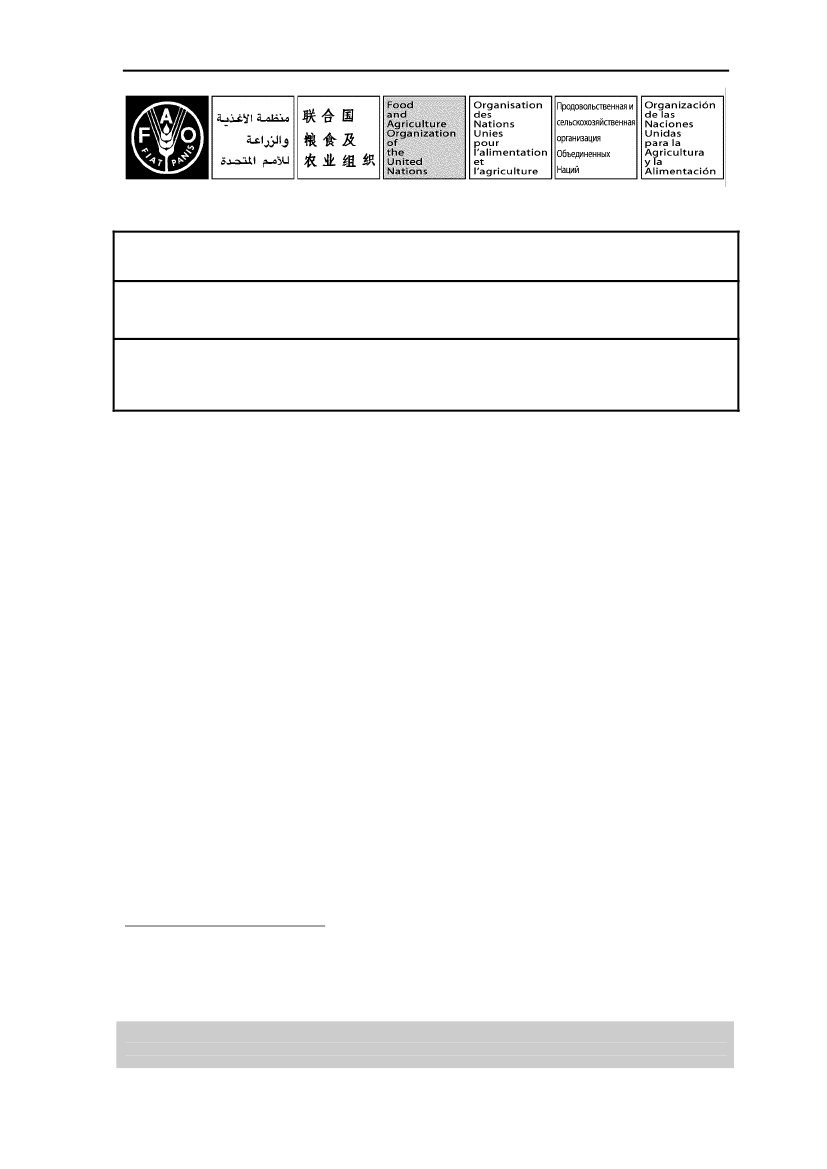Udenrigsudvalget 2009-10
URU Alm.del Bilag 123
Offentligt
WSFS 2009/2November 2009
E
World Summit on Food SecurityRome, 16-18 November 2009DECLARATION OF THEWORLD SUMMIT ON FOOD SECURITY
We, the Heads of State and Government, or our Representatives and the Representative ofthe European Community have assembled in Rome at the World Summit on Food Securityto take urgent action to eradicate hunger from the world.1.In adopting this declaration we agree to undertake all necessary actions required atnational, regional and global levels and by all States and Governments to halt immediately theincrease in – and to significantly reduce – the number of people suffering from hunger,malnutrition and food insecurity. We will reinforce all our efforts to meet by 2015 the targets ofMillennium Development Goal 1 and the World Food Summits. We commit to take actiontowards sustainably eradicating hunger at the earliest possible date.2.We are alarmed that the number of people suffering from hunger and poverty nowexceeds 1 billion. This is an unacceptable blight on the lives, livelihoods and dignity of one-sixthof the world’s population. The effects of longstanding underinvestment in food security1,agriculture2, and rural development have recently been further exacerbated by food, financial andeconomic crises, among other factors. While strides have been made, the overall efforts so farhave fallen short of achieving the Millennium Development Goals and the commitments of theWorld Food Summits. We must collectively accelerate steps to reverse this trend and to set theworld on a path to achieving the progressive realization of the right to adequate food in thecontext of national food security.3.A sense of urgency and a commitment to solving the global food crisis have served ascatalysts for strengthening international coordination and governance for food security throughthe Global Partnership for Agriculture, Food Security and Nutrition, of which the Committee onWorld Food Security (CFS) is a central component. It is essential to enhance global governance,building on existing institutions and fostering effective partnerships.1
Concept of Food Security: Food security exists when all people, at all times, have physical, social and economicaccess to sufficient, safe and nutritious food to meet their dietary needs and food preferences for an active and healthylife. The four pillars of food security are availability, access, utilization and stability. The nutritional dimension isintegral to the concept of food securityIn this declaration the term agriculture comprises crops, livestock, forestry and fisheries.This document is printed in limited numbers to minimize the environmental impact of FAO's processes and contribute to climateneutrality. Delegates and observers are kindly requested to bring their copies to meetings and to avoid asking for additional copies.Most FAO meeting documents are available on the Internet at www.fao.org
2
W0000
2
WSFS 2009/2
4.To feed a world population expected to surpass 9 billion in 2050, it is estimated thatagricultural output will have to increase by 70 percent between now and then. Concomitantly,measures have to be taken to ensure access – physical, social and economic – by all people tosufficient, safe and nutritious food with particular attention to full access by women and children.Food should not be used as an instrument for political and economic pressure. We reaffirm theimportance of international cooperation and solidarity as well as the necessity of refraining fromunilateral measures not in accordance with the international law and the Charter of the UnitedNations and that endanger food security. We call for open markets as they are an essential elementof a global food security response.5.Climate change poses additional severe risks to food security and the agriculture sector.Its expected impact is particularly fraught with danger for smallholder farmers in developingcountries, notably the Least Developed Countries (LDCs), and for already vulnerable populations.Any recipe for confronting the challenges of climate change must allow for mitigation options anda firm commitment to the adaptation of agriculture, including through conservation andsustainable use of genetic resources for food and agriculture.6.Recently, major regional and international meetings have resulted in commitments toincrease support for agriculture, rural development and food security at national and internationallevels. We can also build on the success of several countries in reducing the number of theirhungry, and are encouraged by the time-bound political commitments of some countries andregions to eradicate hunger. Nevertheless, further urgent and decisive measures are needed, andthey must be accompanied by the political will required to move from commitment toachievement of our goal.
STRATEGIC OBJECTIVES7.We decide to:7.1 Ensure urgent national, regional and global action to fully realize the target ofMillennium Development Goal 1 and the 1996 World Food Summit goal, namely toreduce respectively the proportion and the number of people who suffer from hungerand malnutrition by half by 2015.7.2 Join our efforts and expertise to work in the Global Partnership for Agriculture, FoodSecurity and Nutrition – building on existing structures to enhance governance andcooperation – promote better coordination at global, regional and national levels andensure that national and regional interests are duly voiced and considered. We thereforecommit to fully implement the reform of the CFS, which, as the foremost inclusiveinternational and intergovernmental platform for a broad range of committedstakeholders to work together, is a central component of our efforts to further advancethe Global Partnership for Agriculture, Food Security and Nutrition.7.3 Reverse the decline in domestic and international funding for agriculture, food securityand rural development in developing countries, and promote new investment to increasesustainable agricultural production and productivity, reduce poverty and work towardsachieving food security and access to food for all.7.4 Proactively face the challenges of climate change to food security and the need foradaptation of, and mitigation in, agriculture, and increase the resilience of agriculturalproducers to climate change, with particular attention to small agricultural producersand vulnerable populations.
8.To achieve these strategic objectives, we shall base our commitments and actions on thefollowingFive Rome Principles for Sustainable Global Food Security:
COMMITMENTS AND ACTIONSPrinciple 1: Invest in country-owned plans, aimed at channelling resources to well-designed and results-based programmes and partnerships.
WSFS 2009/29.We reaffirm that food security is a national responsibility and that any plans foraddressing food security challenges must be nationally articulated, designed, owned and led, andbuilt on consultation with all key stakeholders. We will make food security a high priority andwill reflect this in our national programmes and budgets.10.We will intensify international support to advance effective country-led and regionalstrategies, to develop country-led investment plans, and to promote mutual responsibility,transparency and accountability. A good example of these elements is contained in the AccraAgenda for Action. We recognize and support the Comprehensive African AgricultureDevelopment Programme (CAADP) under the New Partnership for Africa’s Development(NEPAD) as a good example providing a framework through which we can coordinate oursupport for agriculture and food security. We also recognize and support similar efforts in otherregions such as the “Latin America and the Caribbean Without Hunger 2025” initiative, the“ASEAN Integrated Food Security Framework” and the “Riyadh Declaration to Enhance ArabCooperation to Face World Food Crises.”
3
Principle 2: Foster strategic coordination at national, regional and global level to improvegovernance, promote better allocation of resources, avoid duplication of efforts and identifyresponse-gaps.11.The Global Partnership for Agriculture, Food Security and Nutrition will strive to achievestrategic coordination of efforts at national, regional and global level, building on existingstructures; ensuring inclusiveness of participation; and promoting a genuine bottom-up approachbased on field-level experiences and developments.12.We therefore welcome the efforts of CFS to ensure that the voices of all relevantstakeholders – particularly those most affected by food insecurity – are heard. We endorse the roleof CFS in providing a platform for discussion and coordination to strengthen collaborative actionamong governments, regional organizations, international organizations and agencies, NGOs,CSOs, food producers’ organizations, private-sector organizations, philanthropic organizations,and other relevant stakeholders, in a manner that is in alignment with each country’s specificcontext and needs.13.We fully support the important roles of CFS, particularly in areas of coordination at theglobal level, policy convergence, and facilitated support and advice to countries and regions.Within the context of the implementation plan laid down in CFS reform, CFS will gradually takeon additional roles such as promoting coordination at national and regional levels, promotingaccountability and sharing best practices at all levels, and developing a global strategic frameworkfor food security and nutrition.14.We also call for countries to lead and reinforce food security coordination mechanismsand networks, aiming at strengthening coherence of actions at the national level.15.Within the reformed CFS, we support the creation of a High-Level Panel of Experts(HLPE), whose goal is to ensure the regular inclusion of advice based on scientific evidence andknowledge.Principle 3: Strive for a comprehensive twin-track approach to food security that consistsof: 1) direct action to immediately tackle hunger for the most vulnerable and 2) medium-and long-term sustainable agricultural, food security, nutrition and rural developmentprogrammes to eliminate the root causes of hunger and poverty, including through theprogressive realization of the right to adequate food.16.We affirm the right of everyone to have access to safe, sufficient and nutritious food,consistent with the progressive realization of the right to adequate food in the context of nationalfood security. We will strive for a world free from hunger where countries implement the“Voluntary guidelines for the progressive realization of the right to adequate food in the context
4
WSFS 2009/2
of national food security” and we will support the practical application of the guidelines based onthe principles of participation, transparency and accountability.17.We support rural development, creation of employment and more equitable incomegeneration and distribution to overcome poverty and increase access to food. We will create theconditions for production increases, including access to improved seed and inputs and adaptationof agriculture to climate change, recognizing the mitigating potential of sustainable agriculture.We will work to increase public investment and encourage private investment in country-developed plans for rural infrastructure and support services, including -but not limited- to roads,storage, irrigation, communication infrastructure, education, technical support and health.18.We take note of the work to be undertaken, including by FAO and IFAD, on the follow-up of the International Conference on Agrarian Reform and Rural Development (ICARRD), inview of its relevance to food security.19.We commit to building capacity, focusing on integrated actions addressing policy,institutions and people, with a special emphasis on smallholders and women farmers. Weparticularly stress the importance for developing countries of strengthening institutional capacityto develop and implement effective evidence-based policies that ensure access to food, addressmalnutrition and enable smallholders to access technologies, inputs, capital goods, credit andmarkets. We will, as appropriate, strengthen the capacity of farmers and the capacity of farmers’organizations.20.We will strive to ensure that our populations, in particular vulnerable groups, have accessto safe, adequate, nutritious and affordable food. We will work to strengthen social protectionmeasures and programmes, to enable communities and households to access economic and socialbenefits and contribute to social stability. These include safety nets that protect food consumption,such as cash/vouchers and mother and child nutrition. We recognize the role of international andnational agencies, such as WFP, UNICEF and others, in supporting countries to build and operatethose safety nets.21.We continue to be committed to the provision of, and the unhindered access to, safeemergency food and humanitarian assistance and support for the most vulnerable populations. Werecognize the value of local purchase of food supplies, which supports local markets. We willremove food export restrictions or extraordinary taxes for food purchased for non-commercialhumanitarian purposes, and will consult and notify in advance before imposing any such newrestrictions.22.We will pursue policies and strategies that improve the functioning of domestic, regionaland international markets and ensure equitable access for all, especially smallholders and womenfarmers from developing countries. We support WTO-consistent, non-trade-distorting specialmeasures aimed at creating incentives for smallholder farmers in developing countries, enablingthem to increase their productivity and compete on a more equal footing on world markets. Weagree to refrain from taking measures that are inconsistent with the WTO rules, with adverseimpacts on global, regional and national food security. We reiterate support to a timely,ambitious, comprehensive and balanced conclusion of the Doha Development Round of tradenegotiations that would be important to improving food security. We also support the Aid forTrade Initiative to enable farmers and producers in developing countries to overcome theirsupply-side constraints in agriculture and improve their capacity to produce, process, and trade inagricultural products, and we call for full implementation of the Marrakech decision.23.We will consider non-market-distorting international measures to mitigate the impact offood market volatility on the poor. We encourage the development of measures to manage theeffects of excessive price volatility and of adverse weather events. We encourage policies thatpromote well-functioning markets, better market information, transparency and competition.
WSFS 2009/2
5
24.We request relevant international organizations to examine possible links betweenspeculation and agricultural price volatility and whether a system of stockholding can be effectivein dealing with humanitarian emergencies or as a means to limit price volatility.25.We commit, considering diverse conditions in each country, to support increasedproduction and productivity of agriculture, and to reduce pre- and post-harvest losses. We willimplement sustainable practices, including responsible fisheries, improved resource use,protection of the environment, conservation of the natural resource base and enhanced use ofecosystem services. We will give special attention to crop and livestock systems, fisheries andaquaculture, and forest and tree resources, with a focus on smallholders. We will address accessto, and sustainable use of, land and water; maintaining the health and productivity of allecosystems; and better management of the biodiversity associated with food and agriculture. Wenote, as an example, the perilous state of Lake Chad and encourage all efforts to protect it. Wewill support the conservation of, access to, and fair and equitable sharing of, the benefits arisingfrom the use of genetic resources, in accordance with national law and international agreements.26.We recognize that increasing agricultural productivity is the main means to meet theincreasing demand for food given the constraints on expanding land and water used for foodproduction. We will seek to mobilize the resources needed to increase productivity, including thereview, approval and adoption of biotechnology and other new technologies and innovations thatare safe, effective and environmentally sustainable.27.We will take necessary steps to enable all farmers, particularly women and smallholderfarmers from countries most vulnerable to climate change, to adapt to, and mitigate the impact of,climate change through appropriate technologies and practices that improve the resilience offarming systems, thus enhancing their food security. We aim to enhance and develop financingmechanisms and other appropriate measures to support adaptation to, and mitigation of, climatechange that are accessible to smallholder farmers, and are based on equitable, transparent andeffective institutional arrangements. We will support adaptation by the most vulnerablepopulations to ensure their food security through social protection programmes and safety nets.28.We will promote research for food and agriculture, including research to adapt to, andmitigate climate change, and access to research results and technologies at national, regional andinternational levels. We will reinvigorate national research systems, in particular in Africa, andwill share information and best practices. We will improve access to knowledge. We will improvethe quality of national agricultural statistics and early warning and forecasting systems for foodinsecurity and vulnerability, thus providing a sound basis for agricultural policy and strategies.We will make full use of North-South, South-South and triangular cooperation.29.We will support national, regional and international programmes that contribute toimproved food safety and animal and plant health, including prevention and control oftransboundary animal and plant pests and diseases. We will adopt policies and programmes topromote effective national food safety systems, covering all stages of the food chain andinvolving all actors, that ensure the compliance of food products with science-based internationalstandards, and that improve food safety and quality for our populations. We will activelyencourage the consumption of foods, particularly those available locally, that contribute todiversified and balanced diets, as the best means of addressing micronutrient deficiencies andother forms of malnutrition, especially among vulnerable groups.30.We will continue to address the challenges and opportunities posed by biofuels, in viewof the world’s food security, energy and sustainable development needs. We are convinced thatthe continuation of in-depth studies is necessary to ensure that production and use of biofuels aresustainable in accordance with the three pillars of sustainable development and take into accountthe need to achieve and maintain global food security. We are further convinced of the desirabilityof exchanging experiences on biofuel technologies, norms and regulations. We call upon therelevant intergovernmental organizations, including FAO, within their mandates and areas of
6
WSFS 2009/2
expertise, with the involvement of national governments, partnerships, the private sector and civilsociety, to foster coherent, effective and results-oriented international dialogue on biofuels in thecontext of food security and sustainable development needs.Principle 4: Ensure a strong role for the multilateral system by sustained improvements inefficiency, responsiveness, coordination and effectiveness of multilateral institutions.31.The global reach of the food security issue calls for prompt, decisive and coordinatedaction to address its causes, mitigate its impact and establish or strengthen the necessary measuresto help eradicate hunger and malnutrition from the planet.32.In this regard, we reaffirm our commitment to multilateralism and commit ourselves tostrengthening the ability of the United Nations institutions, especially FAO, IFAD and WFP, andof other multilateral organizations at global, regional and national levels to fulfil their roles inunderstanding of the root causes of hunger and to fashion appropriate responses. We thereforecommit to strengthening the multilateral system in the channelling of resources and in thepromotion of policies dedicated to fighting hunger and malnutrition.33.We support a well-functioning multilateral trading system for the benefits it can bring toall and contribute to enhancing the integration of the developing countries in the system.34.We encourage intensified coordination among all UN agencies, especially among FAO,IFAD and WFP, and the international financial institutions (IFIs). The UN institutions mustcontinue to work together as a system, in accordance with their respective mandates, in order toincrease their effectiveness. We recognize, in this regard, the important work undertaken by theUN High-Level Task Force on the Global Food Security Crisis (HLTF). We encourage UnitedNations reform efforts aimed at improving the efficiency and impact of UN developmentactivities and in this respect take note of ongoing intergovernmental consideration of the UNsystem-wide coherence initiative. We commit to strengthen international coordination, includingthrough the reformed CFS, which includes among its participants HLTF and the relevant UNAgencies and IFIs.35.We support the ongoing reform process in FAO and commit to the timely and fullimplementation of the FAO Immediate Plan of Action, aimed at enabling the Organization tobetter respond to the needs of its Members and to achieve the goals contained in its new StrategicFramework. We also support the reform processes under way in the Consultative Group onInternational Agricultural Research and in the global agricultural research system through theGlobal Forum on Agricultural Research.Principle 5: Ensure sustained and substantial commitment by all partners to investment inagriculture and food security and nutrition, with provision of necessary resources in atimely and reliable fashion, aimed at multi-year plans and programmes.36.At this key moment, we commit to a crucial, decisive shift towards increased short-,medium- and long-term national and international investment in agriculture in developingcountries. We welcome the commitment made by African leaders in the Maputo Declaration toraise the share of agriculture and rural development in their budget expenditures to at least 10percent, and encourage other geographical regions to adopt similar quantitative time-boundcommitments.37.We underline that the fulfilment of all official development assistance (ODA)commitments is crucial, including the commitments by many developed countries to achieve thetarget of 0.7 percent of gross national product (GNP) for ODA to developing countries by 2015and to reach the level of at least 0.5 percent of GNP for ODA by 2010, as well as a target of 0.15to 0.2 percent of GNP for ODA to least-developed countries.
WSFS 2009/238.We note that the share of ODA devoted to agriculture reached a level of 19 percent in1980, but fell to 3.8 percent in 2006. There is, however, an indication that this trend is reversing.3We commit to substantially increase the share of ODA devoted to agriculture and food securitybased on country-led requests. We encourage international financial institutions and regionaldevelopment banks to do likewise. We welcome the commitments of the “L’Aquila” JointStatement on Global Food Security in July 2009, including those towards a goal of mobilizingUSD 20 billion over three years, and we call upon the fulfilment of those commitments. Wehighly appreciate the interest shown and resources mobilized for agriculture and food security byprivate philanthropic foundations in recent years.39.We will strive to strengthen mutual accountability and transparency at global, regionaland local levels, including in regard to donors’ pledges and commitments, and regional andnational initiatives and plans, making use of existing procedures.
7
40.We note the call of the High-Level Expert Forum “How to Feed the world in 2050” for,inter alia,a substantial increase in investment in the agricultural sector in developing countries.We support public/private cooperation and private investment, both domestic and foreign, foragriculture and food security in developing countries. We support the establishment of nationallegislation, as appropriate, to facilitate and sustain private investment in agriculture, nutrition,food security and rural development. We agree to continue studying principles and good practicesto promote responsible international agricultural investment.41.We pledge our actions and support to implement this Declaration.
3
Source: OECD-DAC, Creditor Reporting System. Data for Agriculture, Forestry and Fisheries.







